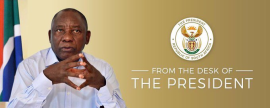
The South African National Defence Force (SANDF) soldiers, who were killed in the eastern Democratic Republic of the Congo (DRC), are African heroes who laid their lives in defence of those who are not able to defend themselves.
This is according to President Cyril Ramaphosa, who addressed the nation through his weekly newsletter on Monday.
The SANDF lost 14 members in the DRC after coming under deadly attack allegedly from M23 fighters.
South African soldiers are in the DRC as part of the Southern African Development Community Mission in the DRC (SAMIDRC) and the United Nations Organisation Stabilisation Mission in the Democratic Republic of Congo (MONUSCO).
“They were killed in violation of a ceasefire agreement between the DRC and Rwanda, facilitated by President João Lourenço of Angola. As a nation, we pay tribute to our fallen soldiers. They are South African and African heroes.
“They lost their lives in defence of the defenceless: the men, women and children who are the victims of one of the world’s most protracted conflicts,” President Ramaphosa said.
The names of the soldiers – as released by the SANDF – are:
- Staff Sergeant William Eddie Cola.
- Staff Sergeant Molahlehi Ishmael Molahlehi.
- Staff Sergeant Shwahlane Theophilus Seepe.
- Corporal Matome Justice Malesa.
- Corporal Rinae Nemavhulani.
- Lance Bombardier Itumeleng Macdonald Moreo.
- Lance Corporal Tseke Moffat Molapo.
- Lance Corporal Metse Stansly Raswiswi.
- Rifleman Sebatane Richard Chokoe.
- Rifleman Derrick Maluleke.
- Rifleman Tshidiso Andries Mabele.
- Rifleman Calvin Louis Moagi.
- Rifleman Mokete Joseph Mobe
- Private Peter Jacobus Strydom.
President Ramaphosa has assured that SANDF participation in the DRC is “subject to the SAMIDRC mission” and will wind down “in accordance with the implementation of various confidence-building measures and when the ceasefire we have called for takes root”.
“As this happens, securing the safety of our troops remains paramount. The situation in the areas where our troops are stationed remains highly volatile. We are making every effort to ensure that our soldiers are well-equipped and sufficiently supported during the mission,” he said.
SAnews on Friday, 31 January 2025, reported on the Extraordinary SADC Summit, which was held in Harare, Zimbabwe, on the situation in the DRC. President Ramaphosa and other leaders at the summit, strongly condemned the ongoing violence in the DRC, where clashes have displaced thousands of civilians.
READ | SADC Extraordinary Summit condemns escalating violence in DRC, calls for urgent action
Silencing the guns
President Ramaphosa explained that South Africa has been a “troop contributing country to MONUSCO since 1999 and we have lent our support to the SADC mission deployed to the region in 2023” – anchored in the commitment to “silencing the guns” on African soil.
“Supporting peacebuilding and the resolution of conflict in Africa has been a cornerstone of our country’s foreign policy since the advent of democracy, as we have sought to draw on our experience of political dialogue and national reconciliation.
“Since 1994, our country has contributed to UN peace operations in Burundi, Ethiopia, Eritrea, Liberia, Nepal and to the UN-AU Mission in Darfur. South Africa has been part of fostering peace in Lesotho, Burundi and South Sudan. In 2022, we hosted negotiations that brokered a ceasefire between the government of Ethiopia and the Tigray People’s Liberation Front.
“Last year marked the end of the SADC Mission in Mozambique (SAMIM), which SANDF troops formed part of. The mission was deployed for three years to combat extremist groups in the Cabo Delgado province. The government of Mozambique has praised SAMIM for its efforts to restore stability to the region and for contributing to a vastly improved security situation,” he said.
In our best interests
According to the President, since the attack on the SANDF soldiers, questions were raised on South Africa’s DRC presence, with some saying “we have no business being there.”.
“Violence and conflict in Africa is the business of all Africans. The humanitarian, economic and social effects of these conflicts are felt across borders and regions. Instability in any part of the continent affects the prospects for growth and development across the continent,” President Ramaphosa insisted.
He said for peace to be secured in the eastern DRC, “there must be an immediate end to hostilities and a ceasefire that must be respected by all”.
“A ceasefire is a necessary precondition for peace talks that must include all parties to the conflict, whether they are State or non-state actors, Congolese or non-Congolese.
"Diplomacy is the most sustainable pathway to achieving a lasting peace for the DRC and its people. We call on all parties to fully embrace the current diplomatic efforts that are aimed at finding a peaceful resolution, including honouring the Luanda Process.
“Strong political will and leadership will be required from all parties to the conflict, as well as respect for the territorial integrity of the DRC,” the President said.
Furthermore, for lasting peace and security to be achieved in the DRC, “the collective will of the community of nations” will be needed.
“As a country, we have a duty of support towards the nations of Africa, whose solidarity and material support helped secure our liberation.
“South Africa will not let up in its support to the people of the DRC, so that they may have the peace and security they rightfully deserve,” President Ramaphosa concluded. – SAnews.gov.za


